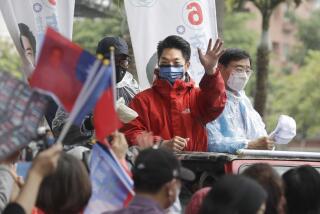A Big City Mayor for China’s Future
- Share via
SHANGHAI — No one has any real idea of whether the U.S. and China are capable of talking their problems out. But if you chat long enough with Shanghai’s Mayor Xu Kuangdi, you almost forget he’s a communist. In fact, Xu Kuangdi sounds more like pragmatic American mayors such as New York’s Rudy Giuliani or Los Angeles’ Dick Riordan than an aloof, pre-programmed robot out of Mao’s Little Red Book (except, of course, that he’s not democratically elected). And this may explain why he’s so well liked by Western multinationals, and so relatively successful in managing China’s most populous city.
Shanghai’s mayor is widely viewed both here and abroad as a major voice of China. This opportunity-rich but trouble-plagued city of 13 million to 16 million (depending on how all the heads are counted) is the place to be if you want to go places in Chinese politics. President Jiang Zemin is a former Shanghai mayor, as is the powerful Zhu Rongji, who’s soon to become China’s No. 2. What’s next for Mayor Xu?
A former Shanghai University official and engineering professor who once was a scholar in England, Xu represents the new breed of Chinese leader who believes that ideology doesn’t really take you very far if you have a leaky roof over your head, little to eat and a bleak future.
When former Mayor Zhu, now China’s economic czar, asked Xu years ago to head the city’s planning commission, Xu complained that he despised the whole idea of central planning. “Then you’re exactly the man I want,” replied Zhu, fed up as well with bureaucracy. That story summarizes as well as anything the spirit of Shanghai, a sprawling metropolis where per capita income is among the highest in China and where lingering European architectural influences serve to remind the visitor of the city’s rakish past as a just-about-anything-goes melding of East and West.
Xu, 60, spoke at the reception room at Shanghai’s City Hall: “A lot of our problems are the result of the old planned economy. The government interfered too much. Whether you were a Western businessman or Chinese, you had to get too many approvals. We have got to simplify everything and make it more transparent. Maybe I should become more like that former New York mayor--What was his name? Right, Koch. The one who was always shouting at the bureaucrats to get things done.” Regarding China’s inescapable pollution and troubled environment, Xu sounds like Al Gore, talking of how to keep “sustainable development and proper environmental protection in balance.”
The only thing that seems sustainable about effervescent Shanghai today is the chaos. Subways are expanding and freeways zigzag here and there but traffic still piles up in frenzied clumps; clusters of skyscrapers streak upward across the river from downtown, then wait for the future to bring them tenants; after sundown residents and tourists mill about the main streets, turning every night into a lively celebration. But if this major metropolis at the mouth of the Yangtze River is to become, as its advocates hope, a Chinese Los Angeles, continuing its development may well prove a struggle. Asia’s economy is slowing and the next few years’ prospect profoundly worries Xu.
Japan and Korea, China’s two largest markets in Asia, are now virtually quiescent. Recently the U.S. giant, Caterpillar Inc., gave up on a new plant because of the sagging economy here. Smaller U.S. outfits are starting to read China as a too-tough investment that takes too many years to turn a profit. In fact, major foreign investment declined last year. In coming months Beijing may have to cope with growing unemployment on a massive scale as the long-planned dismantling of China’s huge, inefficient state industries unfolds. Today’s unemployed workers can become tomorrow’s social instability; Xu knows that street unrest leading to another Tiananmen-style crackdown would further arrest Western investment so crucial to Shanghai.
Xu works to warm up Sino-U.S. relations because he wants Western investors to keep coming. “From the bottom of my heart,” he says, “we like Americans. They’re not like others whose faces you can’t read and who say they like you but are really feeling something else. Generally, Americans are easy to read and we Chinese appreciate that.” Xu professes boundless optimism about the nation’s awesome but shaky investment in the Shanghai industrial development area called Pudong, where many empty office buildings sit in a planned development area as large as Singapore. He smiles: “If we build it, they will come.”
More to Read
Sign up for Essential California
The most important California stories and recommendations in your inbox every morning.
You may occasionally receive promotional content from the Los Angeles Times.













